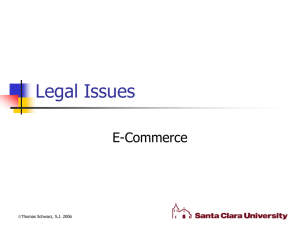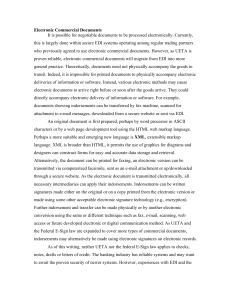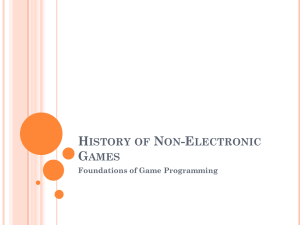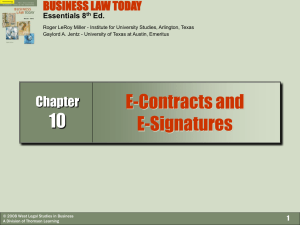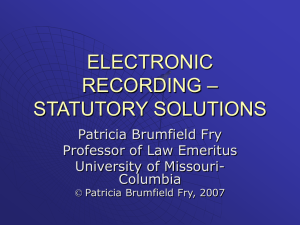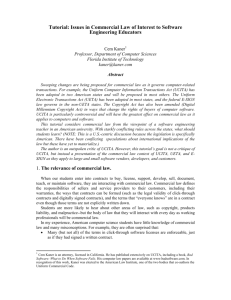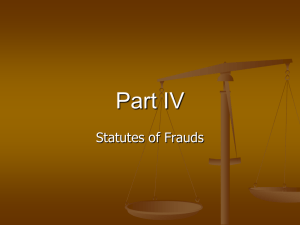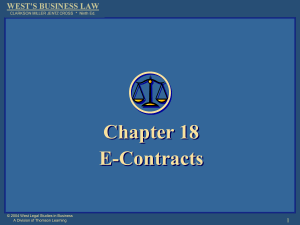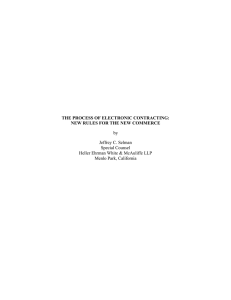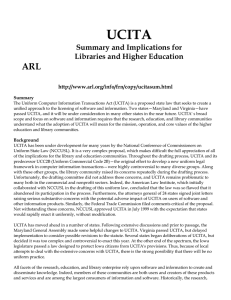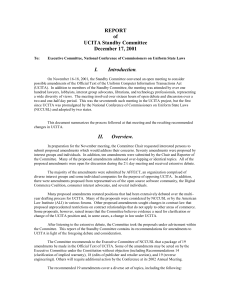Practitioner’s Perspective New Laws Affecting E-Business Transactions
advertisement
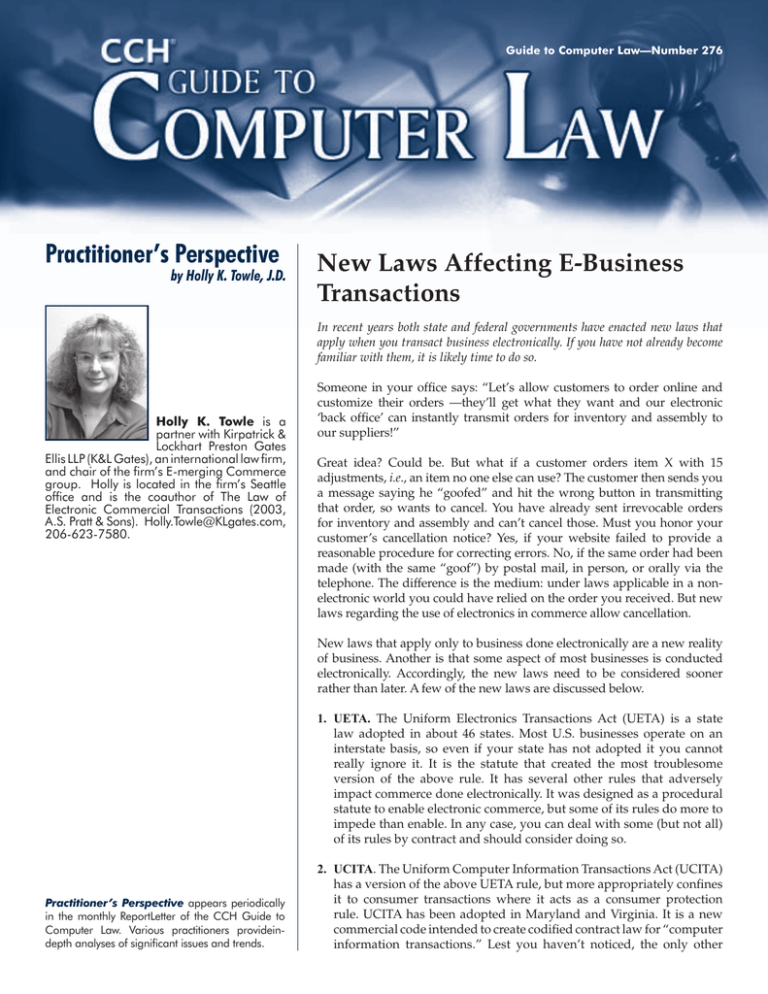
Guide to Computer Law—Number 276 Practitioner’s Perspective by Holly K. Towle, J.D. New Laws Affecting E-Business Transactions In recent years both state and federal governments have enacted new laws that apply when you transact business electronically. If you have not already become familiar with them, it is likely time to do so. Holly K. Towle is a partner with Kirpatrick & Lockhart Preston Gates Ellis LLP (K&L Gates), an international law firm, and chair of the firm’s E-merging Commerce group. Holly is located in the firm’s Seattle office and is the coauthor of The Law of Electronic Commercial Transactions (2003, A.S. Pratt & Sons). Holly.Towle@KLgates.com, 206-623-7580. Someone in your office says: “Let’s allow customers to order online and customize their orders —they’ll get what they want and our electronic ‘back office’ can instantly transmit orders for inventory and assembly to our suppliers!” Great idea? Could be. But what if a customer orders item X with 15 adjustments, i.e., an item no one else can use? The customer then sends you a message saying he “goofed” and hit the wrong button in transmitting that order, so wants to cancel. You have already sent irrevocable orders for inventory and assembly and can’t cancel those. Must you honor your customer’s cancellation notice? Yes, if your website failed to provide a reasonable procedure for correcting errors. No, if the same order had been made (with the same “goof”) by postal mail, in person, or orally via the telephone. The difference is the medium: under laws applicable in a nonelectronic world you could have relied on the order you received. But new laws regarding the use of electronics in commerce allow cancellation. New laws that apply only to business done electronically are a new reality of business. Another is that some aspect of most businesses is conducted electronically. Accordingly, the new laws need to be considered sooner rather than later. A few of the new laws are discussed below. 1. UETA. The Uniform Electronics Transactions Act (UETA) is a state law adopted in about 46 states. Most U.S. businesses operate on an interstate basis, so even if your state has not adopted it you cannot really ignore it. It is the statute that created the most troublesome version of the above rule. It has several other rules that adversely impact commerce done electronically. It was designed as a procedural statute to enable electronic commerce, but some of its rules do more to impede than enable. In any case, you can deal with some (but not all) of its rules by contract and should consider doing so. Practitioner’s Perspective appears periodically in the monthly ReportLetter of the CCH Guide to Computer Law. Various practitioners provideindepth analyses of significant issues and trends. 2. UCITA. The Uniform Computer Information Transactions Act (UCITA) has a version of the above UETA rule, but more appropriately confines it to consumer transactions where it acts as a consumer protection rule. UCITA has been adopted in Maryland and Virginia. It is a new commercial code intended to create codified contract law for “computer information transactions.” Lest you haven’t noticed, the only other CCH GUIDE TO COMPUTER LAW codified commercial code in the U.S., Article 2 of the Uniform Commercial Code, was designed to apply to sales of goods—it works poorly for licenses of computer information. UCITA creates rules for this new subject matter by blending UCC Article 2, common law and intellectual property concepts applicable to information and licensing. It also creates rules for “access contracts,” i.e., the terms and conditions governing access to a website. Even in states where UCITA has not yet been adopted, it makes a good guide to the issues you will encounter in an information economy. 3. E-SIGN. The Electronic Signatures in Global and National Commerce Act (E-SIGN) is the primary federal law enabling e-commerce. In general, it creates equivalency between “paper” and “electronic” media, and “pen and ink” and “electronic” signatures. It avoids most of the problems created in UETA but does not preempt it. If your state has adopted UETA, you will need to examine the somewhat murky preemption provision to determine whether UETA or E-SIGN controls. Even if UETA applies it only impacts state law, so you still need to learn E-SIGN as to federal law. This is especially important for consumer transactions if, traditionally, you were required to deliver a paper disclosure or notice as part of a particular transaction. You cannot use an electronic substitute unless you first provide a new, separate disclosure about the use of electronics, and also obtain the consumer’s consent to the substitution. Here is a simple example of E-SIGN’s sweeping impact. You probably have boilerplate in your important contracts precluding amendment except by a “signed writing.” Or perhaps you rely on a statute of frauds that voids contracts not in a “signed writing” (e.g., a home-owner in several states need not fear that oral conversations with a real estate salesman will create a contract to pay a commission, absent a signed writing). E-SIGN creates equivalency between non-electronic and electronic writings and signatures. Thus, an email can suffice to amend your contract or to create the commission agreement. Of course, the email has to say the right things (e.g., has to contain an agreement to pay a commission, for example). But if your only defense to the amendment or commission contract is that it isn’t on a piece of paper with an inked signature, that is no longer a defense. There is still a “statute of frauds,” but it has been broadened by E-SIGN to encompass electronic media. There’s nothing wrong with that, but it does NUMBER 276 mean that you should learn the new rules and adjust your contracts and procedures accordingly (e.g., you could change your amendment boilerplate to require amendments in a “non-electronic record”). 4. New Language. If you used the term “record,” what would you mean? “Record” is the new term for distinguishing oral transactions from those where something is left behind that can be consulted later (the record)—whether it be non-electronic or electronic. A general definition of record is this: “information that is inscribed on a tangible medium or that is stored in an electronic or other medium and is retrievable in perceivable form.” This includes paper, emails, facsimiles, tapes, and the like. The breadth of the definition may catch you by surprise. For example, if you say amendments may only be in a “non-electronic record” because you want to preclude emails, you will also have precluded faxes. If you want to allow faxes but not emails, you could say “non-electronic records except for facsimiles”. The point here is to illustrate that traditional language will not necessarily work, and unexamined use of new language might not either. It’s a new world. 5. Topic Specific Laws. There is no way logically to categorize the proliferation of new laws governing transactions done electronically. Part of the problem is finding those laws. Another problem is that the same transaction can fall under different law depending upon whether it involves electronics. This creates the refrain “but if I can do it non-electronically this way, why can’t I do it electronically the same way?” A good answer is not always available except for the one your parents used to give you: “Because we said so.” Here’s an example: a new federal law prohibits electronically printing more than the last five digits of a credit card number on a receipt. What about receipts on which the full number is written by hand or imprinted, or what if the entire card is simply copied? The new federal law does not apply. “Federal” was a deliberate qualifier. The states are busy passing non-uniform laws. For example, in California a business that asks to see a driver’s license operates under one set of rules if it takes the number down by hand, and another if it “swipes” the license in an electronic reader. It is possible to articulate a justification (often questionable) for each of these new laws, but the point for purposes of this column is simply this: many new laws apply to business done electronically. If you are not already familiar with them, it may be time to do so.

